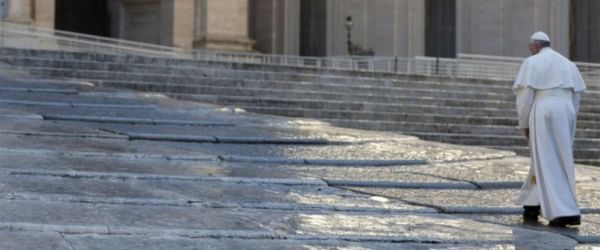Today we will consider the fifth Beatitude which says: “Blessed are the merciful for they shall obtain mercy” (Mt 5:7). There is a peculiar aspect to this beatitude. It is the only one in which the cause and the fruit of happiness coincide: mercy. Those who show mercy will find mercy, they will be “shown mercy”.
This theme of reciprocity of forgiveness is not found only in this Beatitude, but is recurrent throughout the Gospel. How could it be otherwise? Mercy is the very heart of God! Jesus says: “Judge not, and you will not be judged; condemn not, and you will not be condemned; forgive and you will be forgiven” (Lk 6:37). It is always the same reciprocity. And the Letter of James states that “mercy triumphs over judgment” (Jam 2:13).
But it is above all in the “Lord's Prayer” that we pray: “forgive us our debts as we also have forgiven our debtors” (Mt 6:12); and this question is taken up again at the end: “For if you forgive men their trespasses, your heavenly Father also will forgive you; but if you do not forgive men their trespasses, neither will your Father forgive your trespasses (Mt 6:14-15; cf. Catechism of the Catholic Church, 2838).
There are two things that cannot be separated: forgiveness granted and forgiveness received. However, many people struggle; they cannot forgive. Often the harm received is so great that being able to forgive feels like climbing a very high mountain: an enormous effort; and one thinks: it cannot be done, this cannot be done. This fact of the reciprocity of mercy shows that we have to overturn the perspective. We cannot do this alone. We need God’s grace, we must ask for it. Indeed if the fifth Beatitude promises mercy, and in the “Lord's Prayer” we ask for the forgiveness of debts, it means that we are essentially debtors and we need to find mercy!
We are all debtors. All of us. To God who is so generous and to our brothers and sisters. Everyone knows that he/she is not the father or mother that he or she should be, the bride or groom, the brother or sister. We are all “in deficit” in life. And we need mercy. We know that we too have done wrong. There is always something lacking in the good that we should have done.
However, our very poverty becomes our strength to forgive! We are debtors and if, as we heard at the start, we shall be measured with the same measure with which we measure others (cf. Lk 6:38), then it would suit us to widen our measure and to forgive debts; to forgive. Each person should remember that they need to forgive, they are in need of forgiveness and they need patience. This is the secret to mercy: by forgiving one is forgiven. Thus God precedes us and he forgives us first (cf. Rom 5:8). In receiving his forgiveness, we too are capable of forgiving. One’s own misery and lack of justice therefore, become opportunities to open oneself up to the Kingdom of Heaven, to a greater measure, the measure of God who is mercy.
Where does our mercy come from? Jesus told us: “Be merciful, even as your Father is merciful” (Lk 6:36). The more one welcomes the Father’s love, the more we can love (cf. CCC 2842). Mercy is not a dimension among others but rather the centre of Christian life. There is no Christianity without mercy [Cf. Saint John Paul II, Encyclical Dives in Misericordia (30 November 1980); Misericordae Vultus Bull (11 April 2015); Apostolic Letter Misericordia et misera (20 November 2016)]. If all our Christianity does not lead us to mercy, then we have taken the wrong path because mercy is the only true destination of all spiritual journeys. It is one of the most beautiful fruits of mercy (cf. CCC 1829).
I remember that this theme was chosen for the first Angelus that I had to recite as Pope: mercy. And this has remained very much impressed on me, as a message that I would always have to offer as Pope, a message for everyday: mercy. I remember that on that day I even had an attitude that was somewhat “brazen”, as if I were advertising a book about mercy that had just been published by Cardinal Kasper. And on that day I felt very strongly that this is the message that I must offer as Bishop of Rome: mercy, mercy, please, forgiveness.
God’s mercy is our liberation and our happiness. We live of mercy and we cannot afford to be without mercy. It is the air that we breathe. We are too poor to set any conditions. We need to forgive because we need to be forgiven. Thank you!
[1] Cf. St John Paul II, Enc. Dives in misericordia (30 November 1980); Bull Misericordae Vultus (11 April 2015); Ap. Lett. Misericordia et misera (20 November 2016).
(Pope Francis, General Audience 18 March 2020)












